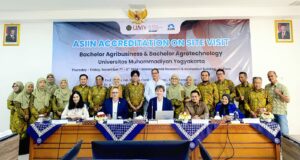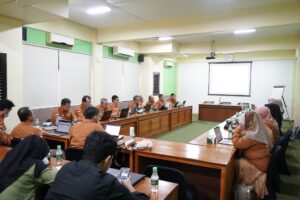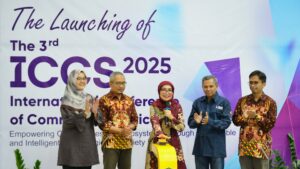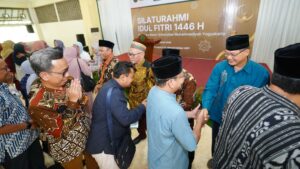Kulihat ibu pertiwi, sedang bersusah hati…”
The lyric of the song titled Ibu Pertiwi is appropriate to describe the current condition of Indonesia. The COVID-19 pandemic that has plagued Indonesia since March disrupted many sectors that support people’s lives, including agriculture. The agricultural sector is in the spotlight because it has close links with national food security. Of course, in a difficult pandemic like today, food security is something that must be sought to avoid the food crisis that seems to haunt Indonesia.
(databoks.katadata.co.id)
Although according to data reported by the Central Bureau of Statistics of the Ministry of Agriculture the national food stock is predicted to experience a surplus until June 2020, but does not mean that Indonesia is immediately free from the threat of a food crisis that could occur in the future. In addition, the end to the COVID-19 pandemic is nowhere in sight, and it has a profound impact on agriculture.
Food security itself has two important components, namely the availability of sufficient and equitable food and the population’s access to food, both physically and economically. Dr. Susanawati, SP., MP, lecturer of Agribusiness at Universitas Muhammadiyah Yogyakarta (UMY), said that if identified from these two points, our food security can be said to be lacking. During this pandemic, the government has implemented the PSBB (Large-Scale Social Limitation) policy in several areas, where the community was asked to reduce physical contact and do work from home. This can affect food production, distribution, and consumption.
Facilities to distribute food are limited, so there is a lack of food production. In addition, with people’s changing lifestyles, the demand of the community as food consumers also changes. This can result in changes in the prices of food products. One obvious example that can be seen is that when most restaurants and cafes are closed, the demand for food items also decreases. “Finally, food that has already been produced in large quantities has decreased in value. The number of SMEs that eventually had to close down in the midst of a pandemic situation and the number of workers who were laid off also affected the people’s economic access to food where purchasing power owned by the community also declined,” explained the lecturer who is familiarly called Nana.
In line with Susanawati, Ir. Gatot Supangkat, M.S, Head of Muhammadiyah’s Environmental Council, revealed that although the amount of food production currently does not undergo much change and can still be said to be safe, the problem of food crisis can still occur in the future. The biggest problem occurs in food distribution. With restrictions, food distribution is weak. As a result, food stocks are uneven in all regions. There are regions that experience deficits and some that experience overproduction.
Farmers as the key to Indonesian food production during this pandemic are expected to remain healthy and work optimally. The problem is that currently, farmers in Indonesia are mostly of old age and very few farmers are millennials. This can affect food production. Sadly, evictions and criminalization of farmers also often occur, even during pandemic times like this when everyone is expected to be able to empathize with one another. Another problem related to food is land availability. Agricultural land is often converted to mining sites and other purposes. As a result, land for farming becomes increasingly narrow, and agricultural plots become polluted by waste from mines and factories.
According to the two sources, the government must take steps to prevent a food crisis. This should start from the welfare of farmers through assistance and facilities such as credit assistance to poor farmers. Farmers should also be introduced to technology to help them distribute and maintain the price of food products in a pandemic like this. Gatot even suggested that farmers be given facilities in the form of technology, capital and marketing through the BUMITANI (Farmer-Owned Enterprises) program. Local agriculture and barns in each region must be revived to build a sense of nationalism. In addition, the government should also consider mapping agricultural potentials, stabilizing food prices, consolidating agricultural land, and make regulations relating to existing food problems.
In addition to the government, the community can also contribute to maintaining food security to avoid a food crisis. The community has the opportunity to build food independence. In a pandemic like this, people tend to be more creative to outsmart the situation. This includes maintaining access to food. The community is expected to have the awareness to carry out minimal independent planting to meet their own food needs. There are many ways to do independent planting such as urban farming and also planting with the hydroponic method by utilizing existing land at home. (ays)






